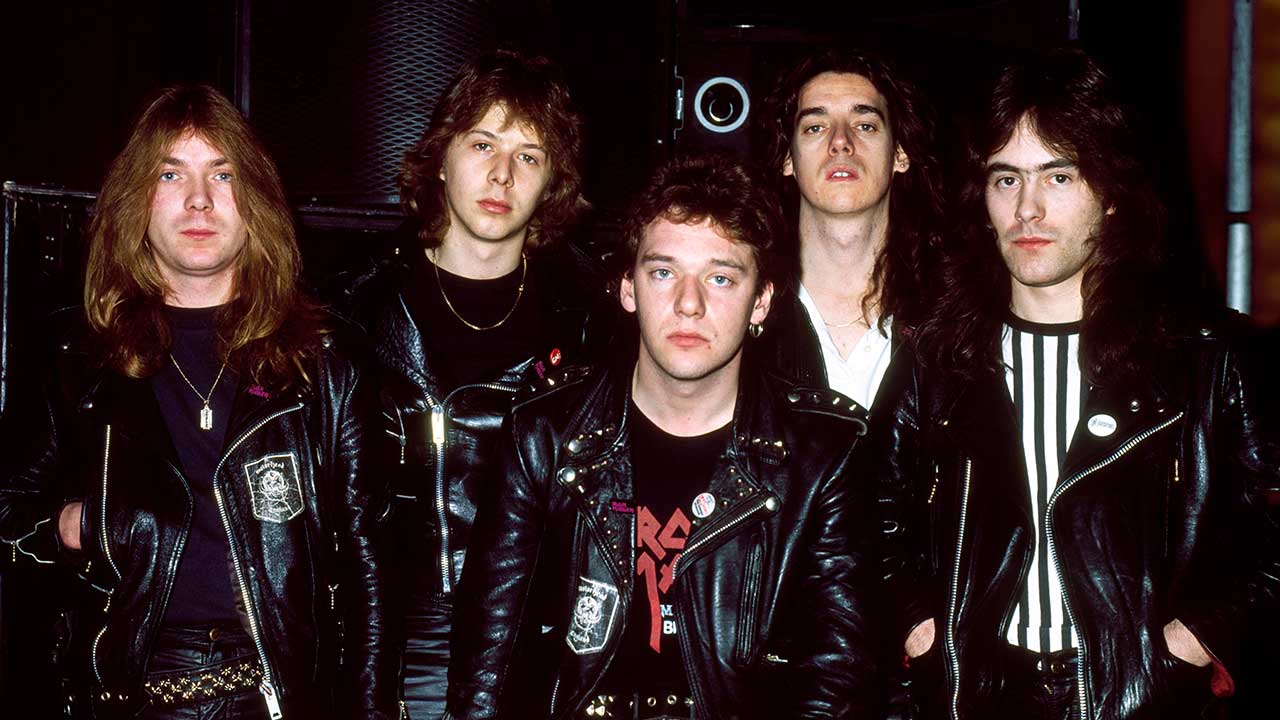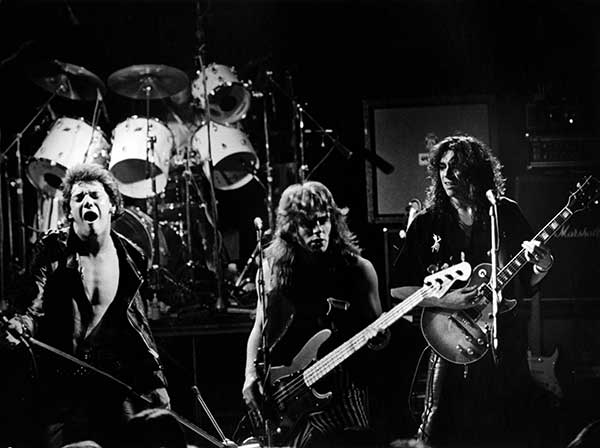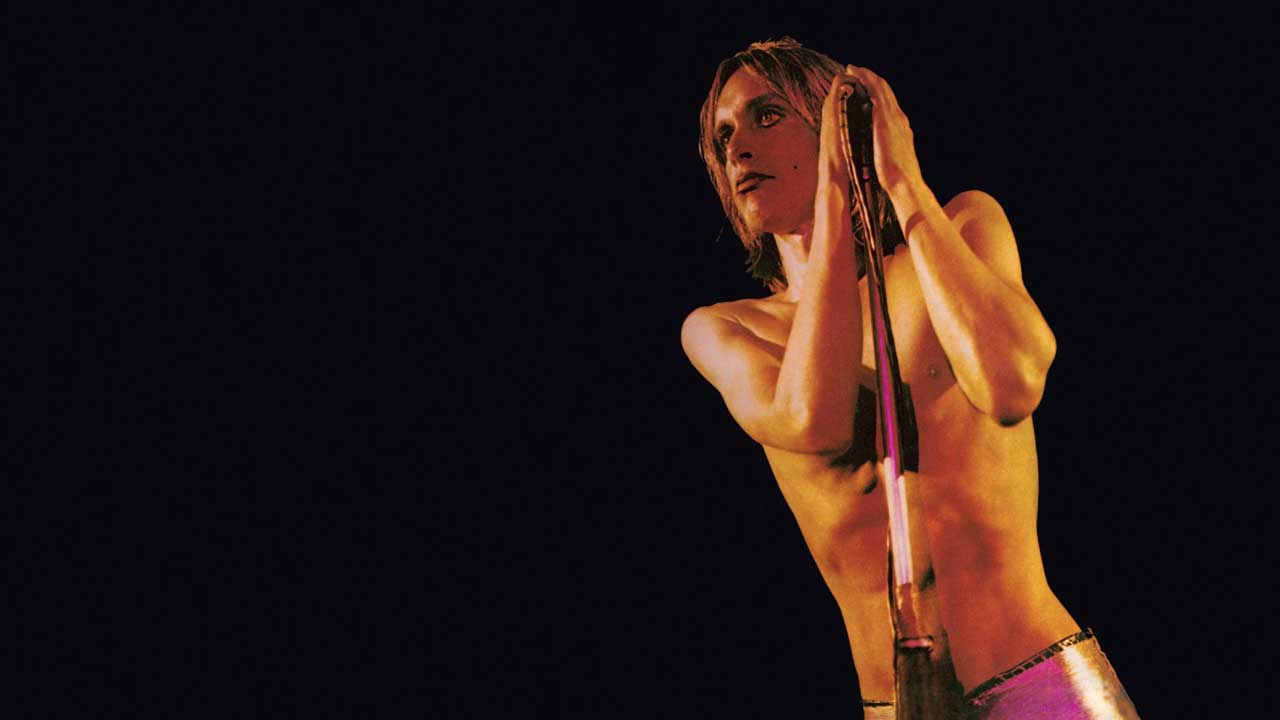In 1980, Iron Maiden hit the road supporting Kiss. We were there
The New Wave Of British Heavy Metal was the musical movement on everybody’s lips, so Iron Maiden went on the road in Europe to see if the NWOBHM could survive outside the UK

It’s an old adage I know, and forgive me for dragging it up again, but life on the road isn’t all it’s cracked up to be. Moments of alcoholic excess, white-line lunacy and stud-farm fever do exist on tour, of course. It’d be foolish to suggest otherwise. But not in anything like the rock and roll all nite/party every day abundance of music folklore.
Nah, your regular ‘hard giggin’ band’ lives not in a drug-infested, groupie-packed underworld but in a distinctly unromantic and altogether harsher reality. All of the above was well and truly rammed home to me in autumn 1980, went I spent some time sur le continent, travelling from European venue to European venue with Iron Maiden.
To annotate the moments of mayhem experienced during this period would be difficult. Alright, so I did catch Maiden singer Paul Di’Anno (later to be replaced by Bruce Dickinson) relieving himself in a hotel corridor and guitarist Dave Murray doing much the same thing in a Holiday Inn ashtray. But in truth, events on any sort of crazed chicken-shooting/plane loop-the-looping level were conspicuous by their absence.
Aw, hell, allow me to cast my mind back, and I’ll try to explain… Iron Maiden are supporting Kiss in Europe and the date schedule is more demanding than a spoilt child continually asking for new toys. It involves travelling vast distances in hectic hours as opposed to leisurely days. Right now we’re thrashing our way from Hamburg in Germany to Leiden in Holland, a trek that makes London to Glasgow seem like a doddle down to the corner shop.
Unlike Kiss, who can afford to fly by jet from date to date, their openers from London’s humble East End are forced to burn rubber down the autobahns. And although the Maiden coach (an American-made custom van costing £9,000 – expensive by 1980 standards) is smooth-running, carpeted, fitted with a selection of swivel chairs and really quite luxurious, we’ve been motoring for so long that at the moment it’s about as comfortable as sitting in a covered wagon jolting down a dusty trail.
It’s 5.30 in the evening by the time we bump across the cobbles of good ol’ Leiden town. With no time to check into the hotel, much less to admire the picture postcard place with its network of canals, we shake and rattle our way directly to the night’s venue.
Inside Maiden’s vehicle it looks like everyone has OD’d on Mogadon. Dave Murray’s head lolls on its side, all blond hair and no face. Paul Di’Anno is slumped gracelessly in his seat, like a man rendered unconscious after an 18-pint session. Drummer Clive Burr’s bonce jerks up and down like a nodding Alsatian’s. And these sorry souls are supposed to be up on stage in an hour-and-a-half from now, poundin’ out a set of gut-wrenchin’, hard-riffin’, ear-blastin’, steamhammer-poundin’ (and strictly no-snorin’) heavy metal? Do me a favour.
Sign up below to get the latest from Classic Rock, plus exclusive special offers, direct to your inbox!
But then the strangest thing happens. As we pull up in front of the backstage gate to the Groenoordhal – a functional, aircraft-hangar-like building – Dave Murray spots a denim jacket with an all-too-familiar band logo stencilled on the back. And another. And then another. Sleepily, we start to sense that the van is surrounded by people.
Hazily, we commence to comprehend that the banging we’re hearing is coming from fans hammering on the van’s bodywork, not from within our heads. Slowly, we begin to understand that this is no spearhead of the Leiden Kiss Army that’s creating havoc outside. No sir – we are in the presence of bona fide Iron Maiden aficionados.
A banner unfurls. The kids holding it are screaming and pointing. It depicts the contorted face of Eddie, the band’s mascot, copied from the cover of their debut album. And by the side of Eddie’s wizened fizzog it reads in screaming great big capital letters: ‘IRON MAIDEN GO OVER THE TOP’.
The effect is startling. It dawns on Maiden that, even in this obscure part of The Netherlands, even at this very early stage of what would later become a spectacularly successful career, they have already made significant inroads.
It’s like the group members (completed by bassist Steve Harris and guitarist Dennis Stratton) have been simultaneously doused with buckets of cold water, had blazing torches shone into their eyes and ringing alarm clocks strapped to their lug ‘oles. Suddenly, Iron Maiden are ready to go.

There follows a 45-minute support slot that is little short of spectacular. Dwarfed by the gigantic Kiss logo – with the last two letters altered slightly from the German section of the tour, thus avoiding unfavourable comparisons with the Nazi SS movement – and with not even a drum riser to decorate their stage set beyond the bare essentials, Maiden nonetheless manage to give the New York band a run for their money.
And when you consider that each member of Kiss is a multimillionaire, you can appreciate that’s no mean achievement. There are some in the audience who initially step back and snarl at the audacity of these little Englanders and their attempts to grab a share of the bill toppers’ glory. But soon enough everyone is won over and has joined in the craziness with the swaying, celebratory throng.
I’ve seldom seen Maiden better – they’re playing at such a fast pace, they’re in danger of starting their second number before they’ve finished their first! The punk/heavy metal crossover begins here, folks: your old hard rock albums from the 1970s have been made redundant by the freshly forged, still-scalding speediness of the Iron Maiden sound.
Later, Paul Di’Anno tells me how much he’s enjoying being on the road with Kiss: “We’re having an amazing time over here. We came over expecting nothing, but it’s been so good. Touring with Kiss is one of the best moves we’ve made – they’ve been so great to us, I’m knocked out.”
Dave Murray nods in agreement: “Kiss have been terrific. On our first gig with them we had trouble with our equipment; it was delayed at some border or other. It eventually arrived about an hour before we were due to go on, so that was okay. But all during the day [Kiss bassist/vocalist] Gene Simmons had been saying to us: ‘Don’t worry, boys – if your gear doesn’t turn up, we’ll make sure you don’t have to cancel.’ Gene was prepared to lend us some of Kiss’s guitars and drums; he even sent someone out to see if he could hire a backline for us. It was a nice gesture.”
Di’Anno: “Kiss could’ve ignored us but they’ve been really helpful; really encouraging. We often notice the band members in the wings, watching our show. They like to see Eddie warming up the crowd; they love that. [Kiss guitarist] Ace Frehley got so carried away, I even saw him climbing up the lighting rig to get a better view – platform boots and all!”
All this is certainly a long way from the Ruskin Arms, the London pub Maiden were playing gigs in not so long ago…
“Yeah,” agrees Murray, a hint of nostalgia in his voice. “I hope our fans don’t forget us while we’re over here in Europe. Although, to me, it feels just the same as it did when we were playing around the pubs in the East End. Just the same…
“The trouble is, you can’t remain a cult band all of your life. You’ve got to make a living. If people want to see Maiden branch out, we’ve got to do it because if we don’t earn money we’ll end up bankrupt. And then nobody’ll be able to see us at all.”
Di’Anno: “But we still want to stay as close as possible to the kids who got us up here in the first place. I don’t want people to start muttering: ‘Oh look, there’s so-and-so from Iron Maiden there. Shall we talk to him or shan’t we?’ Bollocks. They should be able to come over and say: ‘Hello mate, how is it? I thought you played like a cunt the other night’ …something like that.”
“I know what you mean,” chips in Murray. “I also hate people who make posey statements like: ‘Hey man, that was a really great gig’ when you know full well you played like a toe-rag.”
Di’Anno: “It’s kind of frightening, though. I’ve never felt so confident in my life. It’s scary. Sometimes I lie awake in bed at night and ask myself: ‘Am I going over the top, or what?’”
I don’t think so. Di’Anno and his partners in grime are such a basic bunch that, even if they took lessons, they’d never cut it as ‘cool’. But that doesn’t mean to say that they don’t want to improve themselves.
Take Maiden’s self-titled debut album, for example. Six months after its release, Di’Anno says he finds it “rather embarrassing” and is anxious for the follow-up to be “shit hot”. (No wonder his days in the band were numbered!) “The songs are strong enough on stage,” Di’Anno maintains. “On record though, they sound a little weak. Okay, so it was our first album and it was an achievement in a way to have even got it out, but production-wise, when I listen and compare it to some of the LPs I have at home, I think, well, for fuck’s sake, what’s going on? It’s pretty gritty.”
This is a situation that should be rectified by Martin Birch, who’s going to be sitting at the boards for the production of Iron Maiden II (subsequently titled Killers).
“We were really lucky to get him,” says Murray. “He turned down some pretty big bands to do us because he thinks there’s something there he can help bring out. He can pick and choose; he doesn’t have to push himself forward for anything. But he listened to us and said: ‘Yeah, well, I can do a better job than your first album, definitely.’”
Birch, as you may recall, is most famous for his engineering on Deep Purple’s albums.
“That’s the strange thing,” reflects Di’Anno. “The other day I was talking to one of the guys from our record company, EMI, and he said: ‘The reason we signed you is that we believe we have another Deep Purple in the making.’ That freaked me out, but then I thought, yeah, well, maybe that’s true. But, you know, we’ve got to keep it in perspective instead of thinking, alright, we’ve got it sewn up, we’re the new fucking Deep Purple. I don’t know; it’s a bit weird. You’ve got to take it step by step.”
Iron Maiden have a new single out soon, a rendition of the Aussie band Skyhooks’ number Women In Uniform. “I’ve changed the words around a bit,” reveals Di’Anno. “The original was pretty sexist, but our version is really sexist. We thought, right, if the song’s going to be like that we might as well go all the way and make it even worse. We don’t care if we get a slagging for it - all that ‘burn your bras’ bit is a pain in the arse.”
Let’s close with a final Gene Simmons anecdote.
“Gene doesn’t usually wear other bands’ T-shirts,” relates Di’Anno, “so I was surprised when he came up to me the other day and asked for a Maiden one. I said: ‘What do you want it for? You’ll never wear it.’ And Gene replied: ‘You’re right, you won’t often see me in anything other than a Kiss Tshirt. But if I had one with the name of a group that’s going straight to the top on it, then I wouldn’t mind…’”
And Mr Gene Simmons, as you know, is always right.
Geoff Barton is a British journalist who founded the heavy metal magazine Kerrang! and was an editor of Sounds music magazine. He specialised in covering rock music and helped popularise the new wave of British heavy metal (NWOBHM) after using the term for the first time (after editor Alan Lewis coined it) in the May 1979 issue of Sounds.

